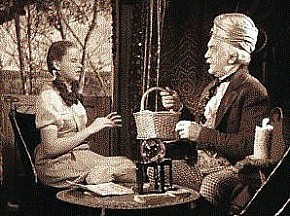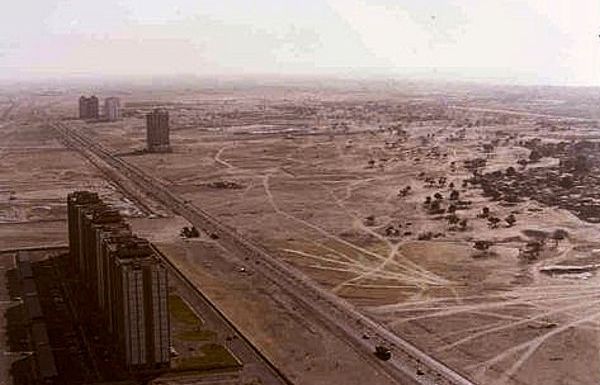2008.10.07 17:07
"I'd say, socially, economically and geographically responsive architecture will trump 'all' and be the movement."
And has architecture really become more about spectacle than building? And, if so, are architects blameless?
2008.10.13 23:45
beach reads
"Hey, did you hear the one about another Colonial Williamsburg in Arabia?"
2008.10.13 23:59
the trajectory of the abstract animal in thirds
omnifrequence
"All the world's a next stage."
2008.10.25 12:26
front-line ideas + regional tradition = potential for a design culture of thinking/making?
Regarding Jarzombek's "Un-Messy Realism", what's important comes at the end:
"We have to realize that our discipline is undergoing an inner transformation of historical import and that sooner or later it will yield an educational system far different from the one we grew up with in the last twenty years. But whether this is for better or worse is difficult to ascertain since there is also a collusion of silence in academe about where the ghost ship is heading."
The "collusion of silence", like a law of silence (utilized by various emperors) is an effective form of control.
More likely it is an outer transformation that is bringing about the inner transformation.
A "collusion of silence" can also breed ignorance via ignoring.
"Official art culture is much more effective in its control of history than Republican strategists, for it knows that the best way to treat contradictory material is not to rail against it, but simply to pretend it didn't happen."
--Mike Kelley, 1992
Be watchful of the inner and the outer to see the full picture.
2008.11.03 08:18
Stab one: a thesis declaration
Judging by the subtext of each of the five paragraphs you just posted above, it looks like "conditioning" is what really permeates your thesis.
aside:
Wondering, will the critical conditioning of a new ideology of space for the 21st century happen more naturally or more artificially?
Speaking of hospitals, currently reading Le Corbusier's Venice Hospital (Hashim Sarkis, editor). It too touches on the notion of a "new ideology of space".
2008.12.03 08:00
pragmatists turning political?
I listened to most of the lecture while doing other work. Interesting, and likely even fruitful, typological analysis in terms of forms and how they may relate to programs and usage, but there remains the hint of force-fit and an even horizontal shift from 'iconic' analysis/design to 'political' analysis/design. As to this work's place within the continuum, I like how this is now being reenacted.
| |
2008.12.30 09:00
pragmatists turning political?
context/inspiration
Pier Vittorio Aureli's "Toward the Archipelago: Defining the Political and the Formal in Architecture" (in Log 11, Winter 2008) lays out the context of Alejandro Zaera-Polo's "The Politics of the Envelope" (in Log 13/14, Fall 2008).
within Toward the Archipelago:
Urbs vs. Civitas
Urbanization
Infinity and Enclaves of Urbanization
The Enclave and the Landmark
The Political
The Formal
The Archipelago
Architecture
passages from The Political:
"Politics arises between men, and it is established as a relationship." (Arendt)
The space in-between can only materialize as a space of confrontation between parts. Its existence can only be decided by the parts that form its edges.
In the dual terms of Carl Schmitt, the space in-between is formed by the decision of who is a friend and who is an enemy. This decision does not exist "as found" in between the parts, but arises from the position taken by the parts that form this space.
...the notion of agonism--the counterpositing of parts--functions as a critical mirroring of oneself via the other to the extent that it is possible to say that to make a collective claim of political autonomy, one must first declare one's counterpoint.
The enemy, on the other hand, estranges us from our familiar self-perception and gives us back the sharp contour of our own figure, of our own position. What counters us inevitably constitutes the knowledge of our own limit.
The political cannot be reduced to conflict per se; it indicates the possibility of conflict and as such calls for its resolution. Even if it means slightly confounding the terms of Hegel's dialectic, the political realizes the resolution of conflict not by a synthesis of confronting parts, but by recognizing the opposition as a composition of parts. This suggests that it is possible to theorize a phenomenological and symbolic coincidence between political action and the form of an object.
[This is the space of the politics of the envelope.]
Both deal with the fundamental question of defining the limits that constitute related but different parts. From this vantage point--the question of a composition of parts, the question of limits posed through the knowledge of the other--I propose to redefine the concept of the formal.
aggregate base
2009.06.14 15:36
please comment or destroy, thank you
Been reading The Judicious Eye: Architecture Against the Other Arts by Rykwert (2008), and, for some reason I'm not entirely sure of, it came to mind as I read the initial post here. I think it's like I see The Judicious Eye as what the above essay draft could be were it really developed (into a dense 492 page book). What the above essay is empty of (and The Judicious Eye certainly is not) is direct reference to specific buildings and designs along with the architects and artists thereof. Interestingly though, The Judicious Eye is more a complicated subject unfolded, and not so much a complexity. Treating the subject of The Judicious Eye as a complexity could be a very robust endeavor however.
2009.07.22 17:40
"This market is a game changer"
What I'm more asserting is that lucrative goals are more objective and "the greater good" is more subjective (if not altogether ephemeral).
What's the object of the new (architecture) game?
What's the subject of the new (architecture) game?
| |
2009.07.30 08:06
Rant Magazine... "Artist"/Designer? submittals
Exponential Potential Architecture
1. Architecture plus Weaponization
2. Architecture minus Weaponization
3. Architecture times Weaponization
4. Architecture divided by Weaponization
5. Architecture greater than Weaponization
6. Architecture less than Weaponization
7. Architecture to the power of Weaponization
8. the Weaponization root of Architecture
2009.08.26 17:19
Postmodernism sucks... discuss
"In the future, all architecture will be post-modern for fifteen minutes."

OR

"What the hell's wrong with you?! Never seen a green architect before?"
| |
2009.09.18 16:54
Your Ideal City mash up....
Neuschwanstein + Las Vegas + Atlantic City + an Indian Reservation + Monte Carlo + Dubai + Angkor Wat + Pompei = "My kind of town."
2009.10.04 11:55
Examples of modern exterior with traditional interior
I was wondering if anyone can point me to some specific examples of built works that have a modern exterior or shell with a traditional/historic interior design. Is there anything out there like Villa Savoye on the outside with like Rococo salons and/or Gothic kitchens and/or Turkish baths on the inside? Maybe Barcelona Pavilion on the outside with Greek temple interior? No hurry. Was just suddenly inspired to ask.
2009.11.16 09:55
The current state of Architecture Theory
"The ability of the computer to locate every point on a carved surface does away with the need for rational comprehension on the part of the designer in conceiving, or the observer in perceiving, a building. Thanks to the computer, pure empiricism has no longer any practical need for the mediating grasp of the intellect. The maximum of an empirical nominalism coexists with the maximum of abstraction. The space between nominalism and abstraction is left void. The mind no longer needs to understand itself. After a long evolutionary detour, human thought returns to its primitive instinctual roots."
Colquhoun (2005)
"...I was entranced by the work of James Gamble Rogers, the architect who designed most of Yale's Gothic and Georgian architecture in the 1920s and 1930s. Roger's determinedly nonideological stance, his avoidance of theory in favor of what can only be called intuitive design, was liberating. It was alright for architecture to be about feeling good, I suddenly realized; stage sets were not immoral. It was the perfect epiphany for a twenty-year-old who was just beginning to learn about empirical experience and only starting to trust his eye."
Goldberger (2009)
2009.11.16 15:25
The current state of Architecture Theory
Jargon aside, it is now progressively easier for intuitive design intentions to become reality.
2009.11.17 16:17
The current state of Architecture Theory
I like my raspberry bushes because they bear fruit twice a year, mid-spring and mid-autumn (like right now). And although still seasonal in their development, there's also this kind of double-helix thing about it.
Architecture theory structured as DNA?
Colquhoun's passage isn't really about how modeling systems work, rather how digital (modeling) data can be manufactured. It's about the voiding of the mediating grasp within the design/execution process. (Not too dissmilar from the voiding of the mediating grasp within the design/execution of self-publising, eg, blogging.
2009.11.17 16:48
The current state of Architecture Theory
That's closer to what Goldberger said. It looks like you're interpolating from both quotations, which, for the most part, is fine, because there is, as you just unwittingly demonstrated, something about the the two quotations intertwined that could well be the germinating point of a[n architectural] value system.
2009.11.27 11:35
Dubai is officially broke.

1990

?
|